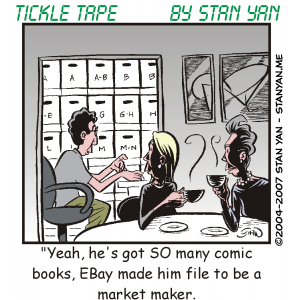Performing with a peak performance mindset requires a close match between your overall profit goals and your skill level. But many traders under- or over-estimate their trading abilities and pay a price for it. In his book “Trading to Win: The Psychology of Mastering the Markets,” Ari Kyiv describes how some traders fall prey to “impossibility thinking” in which a trader thinks, “I can’t do it. I’ll hurt myself.” A little voice inside ourselves doesn’t give us an accurate picture of our abilities and it limits us.
Traders with “impossibility thoughts” hold back. They don’t trade at their potential. Mark Douglas calls such a mismatch between skills and expectations the “reality gap.” Traders underestimate the number of trading opportunities available to them. Rather than use the skills they have at hand, they underestimate what they can achieve and end up missing opportunities. It’s vital to close the gap between your skill level and expectations.
The reality gap works both ways. Some people under-estimate their abilities, while others over-estimate them. Studies of creative, productive people have shown that they accurately gauge their skill level and set goals appropriately. Less creative, unproductive people, in contrast, tend to set overly high expectations. They strive for goals they cannot possibly attain with the limited, but adequate, skills they have. They chase pipedreams and feel frustrated when they don’t even come close to reaching them.
Rather than working with a carefree mindset, they feel bitter that they have not been able to achieve goals they view as within their reach. But productive people are realistic. They have rock-solid confidence because their confident beliefs are based on actual experience where they have tested their skills and have learned what they can and cannot do. Their accurate sense of what they can do allows them to think freely and experience creative insights.
Matching your profit expectations to your skills is often less difficult for a seasoned trader than a novice. Seasoned traders are prone to underestimating their skills and by merely cultivating a winning attitude, by overcoming “impossibility thoughts,” they can reach a realistic, higher level of performance. Behavioural economist Terrance Odean has shown that novice traders tend to overestimate their abilities.
They trade beyond their skill level. A novice trader does not have proven, reliable trading skills and must struggle with finding the right match between skill level and appropriate goals. It takes a wealth of trading experience to fully develop an accurate sense of how well one can trade, and thus, develop expectations commensurate with one’s skills. Just like learning any new skill, it is a process of trial-and-error. Sometimes the novice trader is right, and sometimes he or she is wrong. The key is to manage risk to survive the learning curve and to keep making trades to build up the wealth of experience required to trade like a seasoned professional.
Whether you have been trading for years or are new to the field, success depends on your ability to find a close match between your skills and your expectations. If you are a seasoned trader, don’t hold back. You can probably make more profits if you set your mind to it. And if you are a novice trader, be patient, you’ll get there. For now, carefully manage risk, keep trading, and survive the learning curve.


